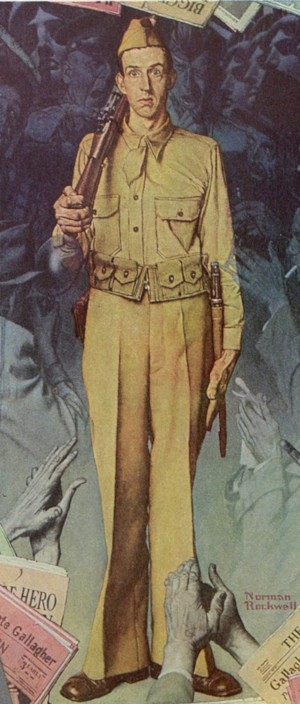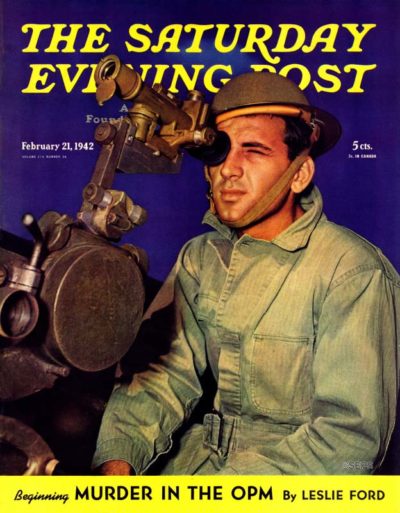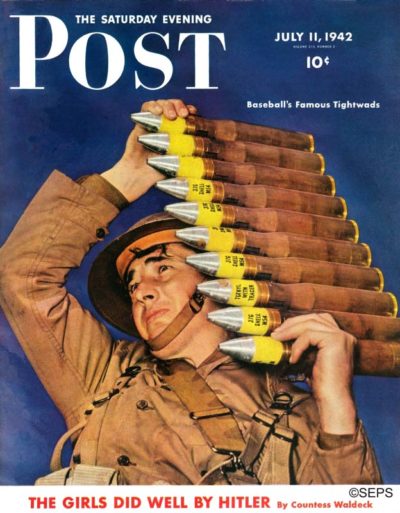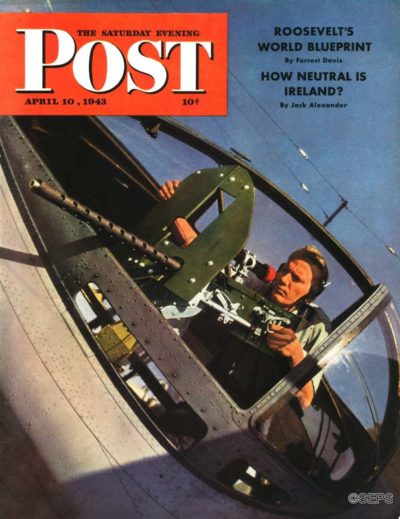If You Were the Average G.I. in World War II
Over 16 million Americans served in the armed forces during World War II. These members of the military might be male or female, from any level of society, as young as 15 or as old as 72, serving anywhere from Greenland to New Guinea.
But if you were the average frontline G.I., you would fit the following description.
You are a 26-years-old white male with nine years of education, who comes from New York and is named John. You were drafted into the army and are now a rifleman in the infantry with a rank of private.
Back home, you have a wife and at least one child hoping for your return.
You are five feet, eight inches tall, and you weigh 144 pounds. During your basic training, which you received at Fort Benning, GA, you gained 5 to 20 pounds and added an inch to your 33 ¼” chest.

Before you were shipped out, you were able to pass the Army Ground Forces test, which involved a minimum number of push-ups, pull-ups, a 70-yard run carrying a man of equal weight on your back, and a four-mile march in 50 minutes.
During that march, you’d probably carry a full combat back pack, which contains toiletries, socks, and personal items. You’d also wear a cartridge belt, to which you’ve hooked your first aid kit with battle dressings, a bayonet, a canteen with mess kit, and a collapsible shovel. Depending on your unit, you might also carry a cargo pack that holds a two-man tent, tent pins, and blanket. And you’d be wearing a helmet. Altogether, it is the same 64 extra pounds you carry in the field — plus your ten-pound, .30 caliber, semiautomatic Garand rifle.
When hungry — and you’re almost always hungry — you prefer cooked meals, referred to as “A” or “B” rations. But you usually get “C” rations, which are ready-to-eat canned individual meals. Each C ration contains canned meat, biscuits, powdered coffee, sugar tablets, chewing gum, four cigarettes, matches, and toilet paper.
When the war is over, you’ll want out of the army as quickly as possible. You’ll return home, where you hope to get your old manufacturing job in a factory, which earned you $200 a month. But right now, you’re earning just $50 a month, and you’re sending at least half home to your wife. You have little use for money, anyway, unless you like playing poker or craps for cash.
You’re out on the front lines this month, somewhere near the French town of St. Lo. Your unit is fighting to break out of the German encirclement of allied forces that have moved inland from the Normandy beaches.
 |
 |
 |
| Photos of World War II soldiers from our covers: February 21, 1942 (Rudy Arnold), July 11, 1942 (Rudy Arnold), and April 10, 1943 (U.S. Navy) | ||
You haven’t got into many firefights with German troops. Most of the work of breaking through enemy defenses is done by the artillery.
You feel you’ve already done your share in the war, but you’re ready to do more. Nothing, you believe, is more important than what you’re doing in this war. You believe Americans back home could do more to help the war effort. And you think some businesses have selfishly used the war to their benefit.
You’re very proud of your unit. You think your officer would do anything they asked you to do. You admire their courage and coolness. You also admire the guys in your unit who “show guts” and disregard their personal safety.
You think getting a dishonorable discharge is one of the worst things that could happen to a man.
When the going gets tough, you remind yourself that you can’t let down the other men in your outfit. You also pray. Combat experience has increased your faith in God and made you more religious.
You’re a fairly compassionate guy. You think men who went AWOL from the battle front “probably couldn’t help it.”
You want to see German leaders punished, but not ordinary Germans. To you, the German P.O.W.s appear to be “men like us. It’s too bad we have to be fighting them.”
Your biggest wartime worry are the Germans’ 88 mm anti-aircraft and anti-tank guns.
Your biggest postwar worry is whether you and your wife will get along together as well as before you entered the service.
You will not be killed in this war. In fact, you will return home without even being wounded.
Featured image: U.S. Army paratroopers (Department of Defense)